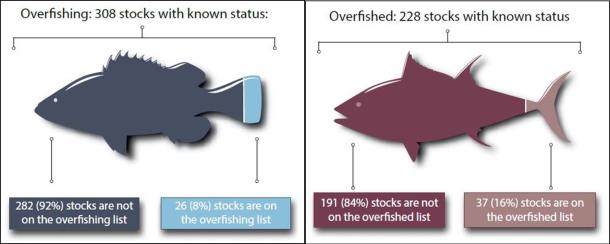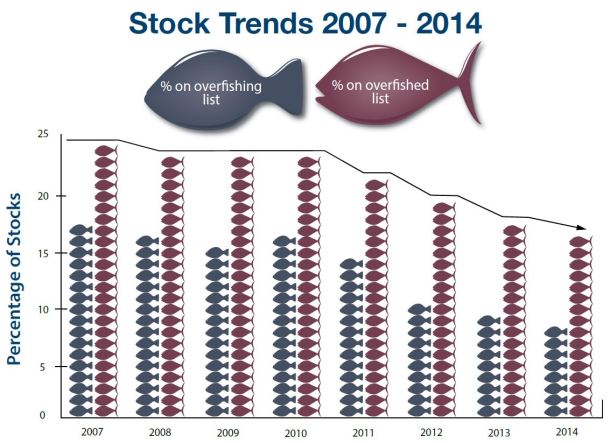Last week, the National Marine Fisheries Service (NMFS or NOAA Fisheries) released their annual Status of Stocks report for 2014. Nationally, the status of our fish stocks is very good. For another year in row, overfishing is affecting a fewer number of stocks and fewer fish are classified as overfished. However, if we dig deeper into the numbers, we are still seeing some serious problems at the regional level, specifically here in New England.
First, a brief background. America’s fisheries are governed by the Magnuson-Stevens Act of 1976. The MSA divided the country into regions, each managed by a council of state and federal representatives, which report back to NOAA Fisheries. “Overfishing” means the harvest rate is higher than the sustainable yield. A stock is “overfished” if the population is too low to produce enough fish to be fished sustainably.
National
By the end of 2014, twenty-six stocks were experiencing overfishing while thirty-seven stocks were overfished. Six stocks were removed from the overfishing list, but four were added. Two stocks were removed from the overfished list, none were added.
New England
Twelve New England stocks remained overfished (red squares below), while eight stocks are experiencing overfishing (navy hexagons below). In 2014, Gulf of Maine haddock was removed from the overfishing list, while North Atlantic albacore was removed from both the overfishing and overfished lists. While these are encouraging results, New England is still falls well behind the rest of the country.
The New England Fishery Management Council is meeting this week in Mystic to discuss a broad agenda, including two important issues on which the future of our fisheries rests: Atlantic herring and habitat protections. Protecting forage fish like Atlantic herring so they can fulfill their role as the bedrock of the marine food web, as well as preserving those critical places fish need for nursery and sanctuary, are essential to the sustainable long-term success of our fishing industry and regional ecosystem.
We look forward to continued work with the NEFMC and our allies around the region to end overfishing and enjoy sustainable fishing for generations to come.
You can find NOAA Fisheries’ complete Status of Stocks 2014 report, as well as an archive of reports going back to 1997, on their website.
Posted by Tyler Archer, fisheries program lead for CFE/Save the Sound.




